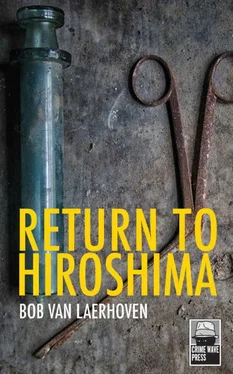From Mitsuko’s notes in the metro cellar
Idon’t know how long I’ve been here.
My body is losing moisture drop by drop, slowly but surely.
I’m imprisoned in a giant press, squeezing me, shrinking me.
My eyes are bulging.
My world has closed in on me.
All the monsters that ever haunted my imagination have locked me in.
I can hear them muttering.
Words of peace.
Words of pain.
And that I’ve never really been myself.
In their eyes I see the reflection of my father.
And the things he has done.
Every child wants to know who his father was, sooner or later.
Something my father once said has stayed with me all my life: “We are the biggest liars the world has ever known. Lies were fed to us at the breast and we grew up with them. We should ask ourselves why.”
My father is the irrefutable king of the born liars. Why? I’ve asked myself that question so many times. I only found the answer when I read Colonel Tadao Masamada’s military logbook. During the war he was commander of a secret Unit 731 complex on Okunoshima Island. The log was with the baby I discovered in my father’s chest in the miners’ changing rooms.
Based on the notes in the logbook I was able to put together a picture of my father, give it shape and colour. But how can I be sure I’m not also an inhabitant of the kingdom of lies just like him?
Okunoshima Island – Unit 731’s secret laboratory complex – September 26 th1944 – Prince Norikazu and Colonel Tadao
The boat arrived after midnight, following a short trip across the Seto Sea from the port of Hiroshima. Colonel Tadao Masamada had informed a few trusted members of his elite troops to expect an important visitor. The men stood to attention on Okunoshima Island’s modest pier waiting for him to disembark. The colonel had warned them not to move a muscle when the Ishibashi-no-miya came ashore. They were to accompany his highness without delay to the ro cells and hand him over to the senior physician, Dr Kenshin.
The colonel, aloof and efficient with ruddy and gleaming rural features that betrayed his Okinawa origins, had concluded: “If the serene one speaks to you, you must address him with the title heika. Do not look him in the eye. He doesn’t like it.”
The soldiers guarding the Unit 731 installations on Okunoshima were well trained, loyal to the Japanese emperor and ready to give their life for him. They stood in attendance, motionless, as ships delivered Chinese pinyins, mostly from Manchuria, and the occasional American prisoner of war to Unit 731’s secret underground complexes. They knew what was going to happen to the maruta and joked among themselves about the “blockheads” and the amount of “juice” they would provide. The underground complexes were referred to as ro cells, square concrete blocks divided by a broad underground corridor, women on the left, men on the right. As with the construction of the laboratory complex commissioned by Unit 731 in China’s Pingfang, the Suzuki Group had done an excellent job on Okunoshima. The complex had every modern convenience, including automatic shutters in the event that one of the maruta succeeded in starting a fire, and lifts capable of carrying several stretchers at a time when the prisoners were ripe for dissection. The suffering endured by the maruta had no effect on the guards and lab technicians. None of them flinched. They were used to tapping the blood of prisoners until they died or injecting them with infectious pathogens and then an array of other substances to see what would happen. They subjected the prisoners to extremes of cold and heat and exposed them to all sorts of toxic substances. They injected poisons and then tried to stimulate their immune systems with exotic substances. The reactions they triggered were often extremely bizarre and almost always incredibly painful.
However, now they were hopelessly nervous. The boat carrying the prince – they called him Rokurobei behind his back, the legendary demon with the neck of a serpent – had arrived. On the outside it looked like all the other fishing boats sailing the Seto Sea; the only difference was the absence of lights. But it managed to tie up alongside the pier with perfect precision in spite of the darkness. To the outside world, Okunoshima had to appear uninhabited. As a precaution, the Japanese high command had removed it from the maps several years earlier.
The soldiers had heard vague rumours about the young man who was about to disembark. Their lieutenant Kitano knew a little more. That’s why his expression quickly turned serious when he caught sight of figures descending the gangplank. One of them towered at least thirty-five centimetres above the others.
Kitano had never seen such a giant before.
Nor had he seen anyone with such a long neck, supported by metal rings that at first sight appeared to be made of silver.
* * *
“Death is an absurdity,” said Prince Norikazu to Colonel Tadao. He folded his long skeletal fingers over his face as if he was greeting an invisible god. The colonel, descended from an ancient rural samurai family, greeted the prince according to protocol and took his place behind his desk, straight-backed and rigid. The prince had been living on the island for several months by this time and appeared to like his military host, but the colonel refused to drop his guard. Tadao tried to remind himself that the young man in front of him, a direct descendant via his father of Amaterasu , the goddess of the sun, was yet to turn sixteen. The prince spoke perfect classical Japanese, the Japanese of the sages. “The military doctors who busy themselves here with pioneering research should focus on the concept of immortality, colonel.”
The colonel nodded politely. The ungainly young man in front of him surprised him by adding: “The Chinese emperors were more closely related to my cast than we will ever admit. In the course of China’s rich and mysterious history they set out to achieve immortality.” The young man looked down at his long, slightly crooked legs: “Magicians of every sort were summoned to the imperial court to make herbal preparations and magical potions, like Ling-zhi , the ‘mushroom of immortality’. Nothing worked, but they kept on trying. Their perseverance should be an inspiration to us. For the first time in history, colonel, science is capable of fulfilling the ambitions of the ancient emperors. Your work is being followed in the highest circles, the people who guide and advise the Emperor himself.”
Colonel Tadao inclined his head at the compliment, but still wasn’t sure where the princely whelp was leading. It was hard to imagine a young man of his age being so obsessed and talking about it with such ease and fluency. Did his deformed body contain a prematurely developed brain? In the first months of his existence, the prince’s life had hung in the balance and the wildest stories emerged about what made him so big. Perhaps his precociousness was a result of an awareness that he was the incarnation of a myth. Speculation was rife about the latter, ranging from the foolish to the insane. Colonel Tadao peered into Norikazu’s dull lustreless eyes and saw a determination nourished by pain, desire and hate. At least, that is what he suspected. The colonel had been raised in the old traditions, which meant he gave due consideration to the possibility that the boy in front of him may not have been entirely human. There was his imperial background to consider, the way he had floundered through his early years. There was Japanese society’s obstinate determination to be a race superior in every respect to other human beings and do everything necessary to reach that goal. .
Читать дальше












